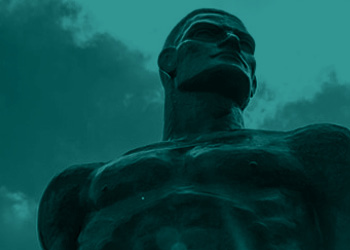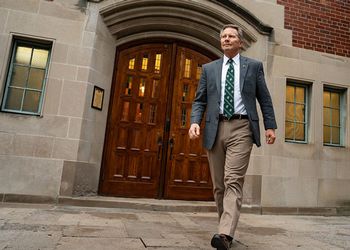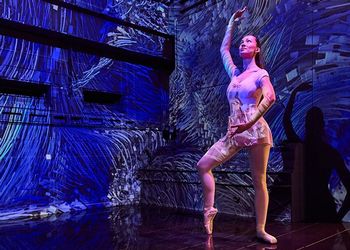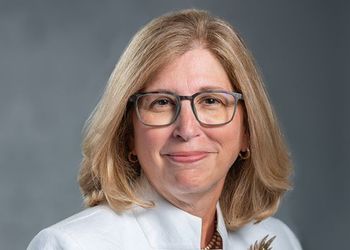Peace Corps: The Power of the Personal

A Force for Good
Three of the many MSU alumni who have served in the Peace Corps affirm the program’s powerful—and personal—impact both abroad and at home
By Tom Kertscher
Thecentennial of the birth of John F. Kennedy this year calls to mind one of his most enduring legacies as president—the Peace Corps, for which Michigan State University is a major source of volunteers.
With 48 alumni now serving in more than 30 countries, MSU ranks 10th among the nation’s large colleges and universities in Peace Corps volunteers. The agency, which recently began giving applicants more control over where they are placed, has broken records in the past several years for the number of applications it receives. That’s a testament to the endurance of the Peace Corps, which was born during the divisive, idealistic 1960s.
“People in the ’60s wanted to be different,” said Elizabeth Cobbs, author of All You Need is Love, the first historical book about the agency. “They didn’t want to just not be their parents. They wanted to find a way to be better Americans. And I think the Peace Corps was just absolutely about that.”
Founded in 1961, the Peace Corps, Cobbs observed in her book, “reassured a broad cross-section of Americans during a turbulent period that there was at least one aspect of their nation’s policy that was indisputably good.”
It’s not surprising that the Peace Corps has flourished partly because of MSU, where John Hannah, who was the university president from 1941 to 1969, made global reach a top priority. Hannah helped establish the University of Nigeria, as well as universities in Brazil, Colombia, Japan and Pakistan, and was a pioneer in sending students overseas to study.
And yet now, more than five decades after its founding—with the agency’s funding in some question under President Donald Trump—it’s fair to ask: Is the Peace Corps still relevant?
We asked three MSU alumni to share their Peace Corps memories, tell how their work helped change the world and comment on the Peace Corps’ role today.
The Peace Corps’ Allure
Family connections of one sort or another drew all three alumni we spoke with to the Peace Corps.
Beth Dunford was influenced by two older brothers who worked internationally. “When I grew up, they were back and forth between Africa and this country and that country,” she recalled. “I think their international life inspired me to want to go to places beyond.”
It was similar for Nick Russon, whose parents met in a Peace Corps orientation class on their way to serve in Chile in 1980. “They raised me to value my blessings and to give back,” he said. “Going out and being a positive force for change, I am helping my country in a way that few other institutions offer.”
Margo Glew was drawn to the Peace Corps by the man who became her husband. While she was an undergraduate at the University of Wisconsin-Madison (the current leader in Peace Corps volunteers), a young man who lived next door told her that he wanted to join the Peace Corps. An aspiring teacher, Glew saw the service as a way to meet both her goals as an educator and her desire to make a difference in the world.
She and the boy next door—Rob Glew, her husband of nearly 30 years—wed just before they left for Niger. “We got married on a Friday and on Monday we were off,” she said. (Rob is an associate dean for academic programs and the director of the Center for Advanced Study of International Development at MSU.)
A Lasting Impact
The three alumni all see their work overseas as having not only a direct impact on the people they served, but as something that has enduring effects—on those people, on themselves and on anyone they interact with.
Russon is currently on a Peace Corps assignment teaching English to 11th-graders in Namibia, a country that puts a priority on speaking English. With a collection of tribes with diverse languages and customs, having a common language can help Namibia in areas such as tourism and trade. “If a person doesn’t achieve in school (and in English), then their opportunities are limited,” Russon said.
He also leads movie, debate and chess clubs for students. Separately, he runs soccer camps and is a member of a group working to fight HIV/AIDS by teaching youth and local volunteers about preventing the disease.
“Normally, tourists are referred to as ‘shurumbu,’ meaning essentially white person. I knew that the people of the town recognized me and the impact I was having when I would walk down the street and would be greeted as ‘omitiri’—teacher,” said Russon, who formerly worked as a substitute teacher in Michigan.
But a volunteer’s presence goes beyond the classroom. “I can tell you how many people can conjugate a verb correctly, but that is only a part of the impact that a volunteer has,” he said. “What you’ve accomplished and how you change people just by being a friendly, compassionate person is truly immeasurable. Your actions cause chain reactions and influence opinions in ways that you will never be able to see.”
Glew taught at a high school in Niger for students who want to become educators in the villages. She also helped develop an English-language textbook for use in local schools that was more culturally relevant to West Africans.
Glew, who is now the coordinator of global initiatives and director of the Global Educators Cohort Program in the Department of Teacher Education at MSU, said her work in Niger helped hone her craft as an educator and stoked her passion for global education.
That passion is evident in her work at MSU, which is aimed at preparing teachers to educate students for success in a global society. “We’re educating students to be world citizens, to develop diverse classrooms, so students are comfortable with and able to work in a multicultural, globally diverse society, whether that be their own local community or in global engagement around the world,” she said. “So, my impact (from Peace Corps) has increased exponentially because (I’m training) educators who in turn are making a difference in their classrooms.”
During her Peace Corps service, Dunford taught English at a trade school in Morocco, then health education in primary schools. She helped get malnourished babies healthy and helped bring clean water and a sanitation system into the school. Now she is assistant to the administrator in the Bureau for Food Security at the U.S. Agency for International Development, the federal government’s main overseas health and development body.
Like Glew, she sees the lasting impact on herself. “As the classic story goes, I benefitted so much more (than the Moroccans did); it really changed my world view, and as I’ve gone on in my career and become a development professional at a fairly high level,” she said.
“Just knowing in your bones what it’s like to live in a village, what problems people face on a daily basis—that sort of innate experience and knowledge that comes from being a Peace Corps volunteer—has really helped change who I am as a person, but also really helps guide me in my work the past 25 years and is infused in what I do every day.”
Changing Perceptions of Americans
A less tangible but crucial benefit of Peace Corps work, according to the volunteers, is how it helps shape the way people around the world view Americans. That impact keeps the Peace Corps relevant today.
“I remember how when I first arrived, the students’ view of Americans was skewed,” Russon said. “They wanted to know what celebrities I knew personally. As we spent time together, their perceptions of me and other Americans became more down-to-earth. The teachers saw me as a friend and colleague and the students saw me as a mentor and a guide.
“The experiences we share with our host country and our friends and family back home are crucial in combating ignorance and prejudice,” he added. “We offer a genuine and positive model of an American. The news coming from America is often negative. Our politics and many of our actions around the globe do very little to portray America in a favorable light. Who we are as a people is often lost in these stories.”
Dunford recalled that “so many people I would meet all knew some Americans who were Peace Corps volunteers and they had such a favorable view of these people. Village after village around the world that I’ve been to (since then), people will tell me of the American they knew. I do think that helps people have a better view of Americans.”
Similarly, said Dunford: “It’s important for Americans to get out there and understand how other people live and the challenges they face. It helps our relationships abroad. It’s just as important if not more important than it ever was.”
Glew said the power of Peace Corps service is in the one-to-one interaction, but the overall effect for America is much broader.
“The goal of the Peace Corps, it’s really not about grand gestures or saving a village or building a well, even though many of these things do take place in service,” she said. “I think the power of Peace Corps is in the every day and the little things of living in the community and going through the day to day with your neighbors, living with, engaging with and working to help individuals in your community. Over time, those interactions and those experiences result in a powerful and transformative experience for the volunteers and, I believe, for the community members.”
Glew said the impact Peace Corps volunteers make affects generations.
“Americans were viewed as people who cared and were interested in engaging with them and working together to address complex, challenging problems,” Glew said, reflecting on her time in Niger. “It’s a view of Americans as partners in working together to make the world a better place. That was a really powerful outcome of the vision that Kennedy had.
“Some of the institutions that we’re sort of counting on to solve our world’s problems aren’t always doing the job we want them to do, and what the Peace Corps provides you is an opportunity to do something,” she added.
“If we ever kind of get hopeless or feel frustrated that nations can’t get together and solve a pressing world problem, then why can’t individuals just go and do their part? And if enough individuals do what makes sense to them to make a difference, then maybe the bottom up is a better a way to go. It’s another approach.”
Then there’s the benefit that returned Peace Corps volunteers bring home.
“The impact in country is powerful, but in many ways the more powerful impact is on the way individual volunteers translate that experience in their work when they return,” Glew said. “And so how could that ever be a bad thing?”
Tom Kertscheris a PolitiFact Wisconsin reporter for the Milwaukee Journal Sentinel. His reporting on the Steven Avery criminal case was featured on TV’s Making a Murderer. He’s also the author of sports books on Brett Favre and Al McGuire. Follow him at TomKertscher.comand on Twitter: @KertscherNewsand @KertscherSports.
FEATURED VOLUNTEERS
Beth Dunford,PhD ’03, MA ’99(Both in Social Science), holds one of the leading global healthpositions in the U.S. government. She is the assistant to the administrator in the Bureau for Food Security at the U.S. Agency for International Development (USAID), the federal government’s main overseas health and development body. She served for the Peace Corps in the North African country of Moroccofrom 1992 to 1995.
You can follow her on Twitter at @Beth_Dunford. Find a video of a speech she gave in 2016 on youth, agriculture and food security at https://agrilinks.org/blog/watch-usaids-beth-dunford-youth-agriculture-and-food-security.
Margo Glew,PhD ’98, MA ’93 (Both in Arts and Letters), is the coordinator of global initiatives and director of the Global Educators Cohort Program in the Department of Teacher Education at MSU. In the Peace Corps, she taught English as a foreign language to high school students in the West African nation of Niger from 1988 to 1990.
Glew won a 2016 MSU Alumni Club of Mid-Michigan Quality in Undergraduate Teaching Award, which recognizes teachers “who demonstrate substantial continuing involvement in undergraduate education.”
You can follow her on Twitter at @glewmarg.
Nick Russon,’11 (Social Science), is currently[NN2] on a Peace Corps assignment as an English teacher in Namibia, in southwest Africa. He formerly worked as a substitute teacher in Michigan public schools.
Break out box
By the Numbers
Top (Big) Ten school: With 48 alumni serving in more than 30 countries around the world in 2017, MSU ranks 10th among the nation’s large schools for the number of Peace Corps volunteers. (The University of Wisconsin-Madison is first, with 87.)
Consistent producer: Since the Peace Corps’ founding in 1961, 2,387 MSU alumni have traveled abroad to serve as volunteers.
For More Information
The Peace Corps at MSU: Telephone: 517-432-7474; email: msupeace@msu.edu; online: www.isp.msu.edu/international-centers-units/student-scholar-programs/peace-corps/
JFK at MSU: Find the transcript of a speech, Kennedy made at MSU on Oct. 14, 1960, during his presidential campaign at www.jfklibrary.org/Research/Research-Aids/JFK-Speeches/Michigan-State-University_19601014.aspx. A photo of the visit can be found at www.flickr.com/photos/msuarchives/4419914149.
Pull out quotes:
“I knew that the people of the town recognized me and the impact I was having when I would walk down the street and would be greeted as ‘omitiri’—teacher.” –Nick Russon
“Just knowing in your bones what it’s like to live in a village, what problems people face on a daily basis……really helps guide me in my work the past 25 years and is infused in what I do every day.” – Beth Dunford
“I think the power of Peace Corps is in the… little things of living in the community and going through the day to day with your neighbors . . . Over time, those interactions and those experiences result in a powerful and transformative experience for the volunteers and, I believe, for the community members.” –Margo Glew



